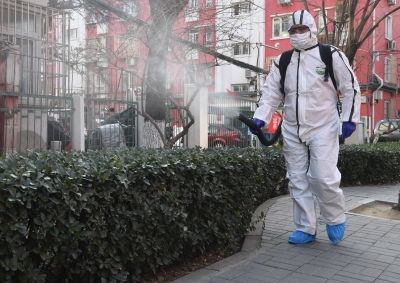Fresh COVID-19 outbreak in Beijing under control
By IANS | Published: June 19, 2020 10:43 AM2020-06-19T10:43:46+5:302020-06-19T10:55:14+5:30
A fresh coronavirus outbreak that emerged at one of Beijing's food markets has been brought under control, a top ...

Fresh COVID-19 outbreak in Beijing under control
A fresh coronavirus outbreak that emerged at one of Beijing's food markets has been brought under control, a top epidemiologist said.
The Chinese capital still remains in a state of alert, with tough restrictions in place and widespread testing underway, but the infection curve in the wake of a localized resurgence of COVID-19 has been flattened, reports fe news.
Wu Zunyou, chief epidemiologist at the Chinese Centre for Disease Control and Prevention, said the number of new cases had dropped by 10 between Wednesday and Thursday.
On Tuesday he said that the following 48 hours would be crucial in containing the fresh outbreak.
Authorities reported 36 infections on Monday, the highest in Beijing even during the height of the outbreak, 31 on Tuesday and the same on Wednesday, which fell to 21 on Thursday.
"In the coming days we will continue to see new confirmed cases but the transmission of the virus is under control so the curve will gradually flatten. The outbreak is under control," Wu said at a press conference in Beijing.
He said that fresh outbreaks, such as this one which has seen 158 new cases in the capital, were to be expected.
"This does not mean that as of tomorrow the cases will decrease dramatically, the curve will gradually decrease," he added.
He said there will be further "sporadic" infections but that the peak of transmissions was reached on June 13.
The expert added that the origin of the outbreak was related to the storage of shellfish in markets at low temperatures and in humid conditions.
This would have been the case at the focus of the latest outbreak which was the wholesale food market in Xinfadi, in the Fengtai district of the city, which is the largest of its kind in Asia.
"More research is still needed but I think these conditions make the virus hide and survive," Wu said.
"Last year when the cases started in Wuhan we suspected that wild animals might be the cause.
"This new outbreak in Beijing has made us look back: it offers a new direction to look to solve this mystery."
He explained that the cases detected on Wednesday had been infected before June 12 and predicted that further positive results in the coming days would also not be recent infections.
Pang Xinghuo, deputy director of the Beijing Municipal Center for Disease Prevention and Control, said none of the cases reported on Thursday are serious and five of them are "very minor".
Eight different focuses of infections related to the Xinfadi market have been detected in the city, he added.
One of them is a restaurant where a chef bought food at the market and transmitted the virus to another worker in the establishment.
Wu said if Beijing had not taken "timely measures" the outbreak would have been a repeat of what happened in Wuhan, where the pandemic first emerged last December.
Strict restrictions were still in place in the city to stem the rate of infection and 87,000 nucleic acid tests have been conducted in the Fengtai district.
Workers at restaurants, universities and markets will continue to be tested and the establishments will be disinfected.
A total of 356,000 tests had been carried out by Wednesday, according to municipal authorities.
In addition, those who have visited the Xinfadi market since May 30 and those who have maintained contact with those who work there should undergo two coronavirus tests, one before and the other after being isolated for 14 days in their communities.
Those who have had contact with the market and residents in high and medium risk areas are not allowed to leave the city.
The Huaxiang neighbourhood, where the market is located, is considered high-risk and 32 medium-risk areas have also been declared throughout the city.
Pan Xuhong, deputy director of municipal public security, said the restrictions "do not mean that the city has been sealed" and that the objective is "to prevent the virus from spreading through the capital or reaching other cities".
Inter-provincial flights have also been suspended, more than 60 per cent of inbound and outbound services were cancelled on Thursday, schools have been closed and residents advised to work from home.
The Central Commission for Discipline Inspection of the Communist Party of China said on Thursday that "there is an urgent need for the country to improve sanitation standards and minimize health risks in the markets".
As of Friday, China had a total of 84,494 COVID-19 cases, with 4,638 deaths.
ksk/"The epidemic is a mirror that not only reflects the dirty and disorganized aspect of the wholesale markets, but also shows the low level of its management," it added.The coronavirus was first detected in the Huanan seafood market in the Chinese city of Wuhan, while in Beijing the outbreak was registered in the Xinfadi outbreak, which covers an area of 112 hectares and has 1,500 employees and more than 4,000 stalls.
( With inputs from IANS )
Open in app